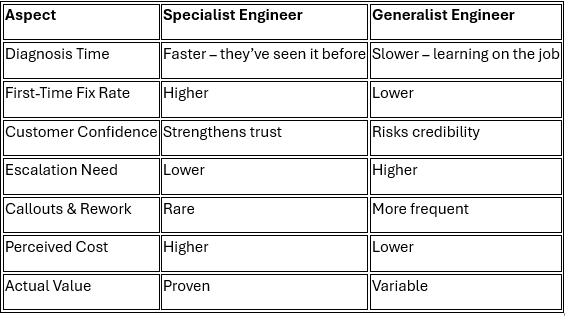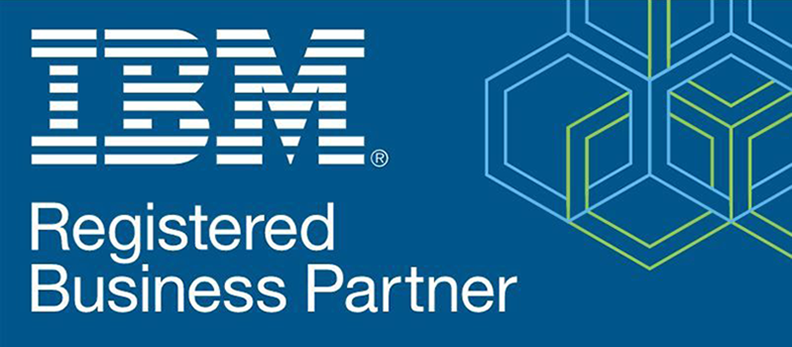Reclaiming Confidence in IBM Support: Why Engineering Expertise Still Matters
23 June 2025 - 4 Minute Read
If you're running IBM Power systems with IBM i or AIX and you’ve noticed the quality of support slipping, you're not imagining it.
More and more IBM users are sharing a common experience:
- Engineers arriving on site unfamiliar with the system
- Delays in diagnosis or resolution
- Increased escalations due to lack of specialist knowledge
In some cases, clients are left fixing issues themselves or waiting while the engineer "gets up to speed." It’s not just frustrating, it reflects a wider industry trend: the steady decline of IBM-specific engineering expertise within third-party maintenance (TPM) providers.
Why This Is Happening?
It’s not always about bad intent. It’s about budgets & EBITDA. Many TPMs have spent the last few years stripping out costs and one of the first places they’ve looked is engineering payroll. Here’s the uncomfortable truth: 30 years of experience usually means 30 years of pay rises. That kind of salary base doesn’t sit easily on a spreadsheet next to a younger, generalist engineer who can be billed at half the rate. So the logic goes: “Why keep the expensive specialist when a generalist can cover more ground for less?”
But here’s what the spreadsheet doesn’t show:
• The lost time when a generalist has to escalate or guess
• SLA breaches and repeat site visits
• The customer who loses confidence after one bad experience
Replacing deep IBM expertise with cheaper labour might balance the budget but the service becomes unbalanced. And in IBM environments, that’s a risk many businesses only discover the hard way.
Specialist vs Generalist: Who Really Costs More?

What looks cheaper on a salary line often costs more across the customer experience.
In mission-critical IBM estates, you can’t afford to learn on the job.
The Machine Code Problem
Another serious risk and one that many businesses don’t fully understand until they hit it is IBM’s control of Licensed Internal Code (Machine Code). If you don’t have an active IBM Hardware Maintenance contract, your TPM provider will not have full entitlement to:
• Run essential diagnostics
• Perform firmware updates
• Resolve certain classes of hardware issues
Without access to the right tools and code, even a well-meaning engineer can’t complete the job leaving you exposed to extended downtime, unsupported fixes, or licensing breaches.
OEM Support May Now Be the Better Deal
In the past, TPM was the obvious commercial choice. That’s not always true anymore. When you combine IBM Hardware and Software Maintenance, it’s often priced more competitively than many expect and significantly reduces operational risk. With OEM support, you get:
• Certified engineers who understand your environment
• Full access to diagnostics, firmware, and fixes
• Integrated support across hardware and software
• No ambiguity over compliance or entitlement
If you’re still choosing TPM based solely on cost, it may be time to reassess.
What Should IBM Users Do Now?
Ask yourself:
• Are the engineers you're relying on IBM-trained and experienced?
• Can your provider legally access Machine Code and OEM tooling?
• Are you truly saving money or just accepting more risk?
In complex IBM environments, support quality isn’t a luxury it’s a business continuity decision. A cut-price support contract that leaves you exposed is no bargain at all.
Baby Blue Can Help You Reassess Before It’s Too Late
At Baby Blue IT Consulting, we help leadership teams re-evaluate their IBM support model. Whether you’re using TPM today or considering a switch, we’ll help you weigh the trade-offs in cost, risk, and capability with honest, informed guidance.
Led by IBM technology experts Chris Smith and Lee Bailey, we bring decades of insight into IBM infrastructure, global support delivery, and the real-world impact of engineering capability.
Through our trusted network, we also maintain access to highly skilled, IBM-trained engineers specialists who understand the hardware, the operating environments, and the urgency that enterprise support demands.
If you’re ready to regain confidence in your IBM support, we’re ready to help.
📧 info@babyblueitconsulting.com
About the Author

Chris Smith
Chris Smith is a sales leader and consultant with over 30 years of experience in IT managed services. With a background in IBM hardware maintenance, he transitioned from field engineer to sales and marketing director, creating the foundations for Blue Chip Cloud, which became the largest IBM Power Cloud globally at the time. Chris played a key role in the 2021 sale of Blue Chip and grew managed services revenue by 50%. He’s passionate about building customer relationships and has implemented Gap Selling by Keenan to drive sales performance. Now, Chris helps managed service providers and third-party maintenance businesses with growth planning and operational improvement.
LinkedIn

